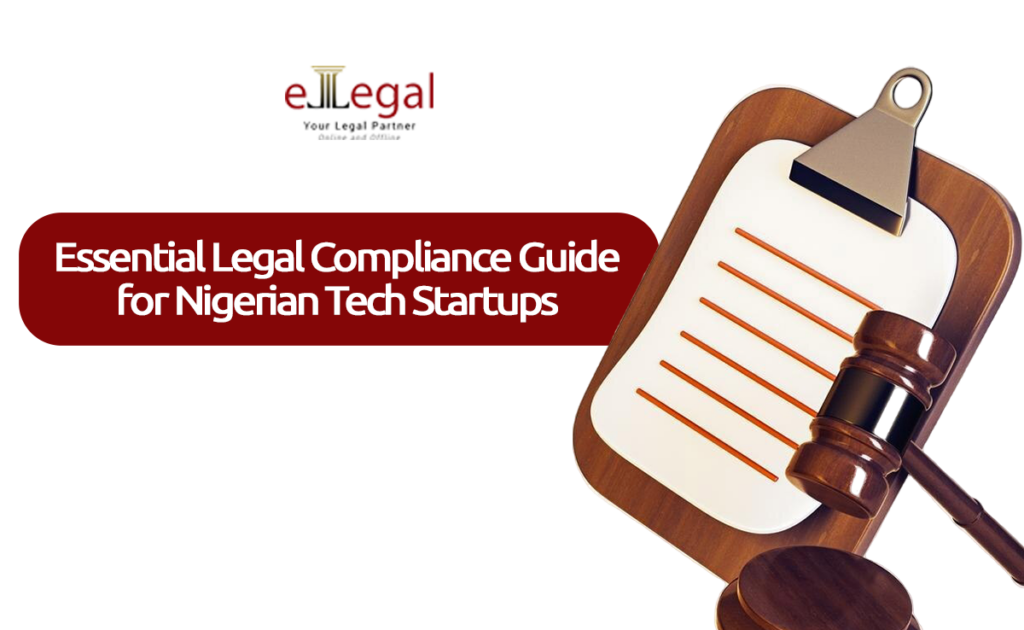The tech industry in Nigeria is rapidly becoming one of the most dynamic sectors in Africa, drawing in substantial investments from local and international sources. With innovations in fintech and e-commerce, startups are addressing key challenges and transforming established industries. However, these startups must understand the legal framework to maintain compliance and ensure long-term success. This blog offers a detailed overview of the legal necessities, regulatory responsibilities, and best practices for tech startups operating in Nigeria.
Understanding the Legal Framework for Startups in Nigeria
Every tech startup operating in Nigeria must operate within the country’s legal framework. The legal framework for startups in Nigeria is governed by various laws, regulations, and policies that ensure businesses operate fairly, transparently, and ethically.
Key legislative instruments include:
- Companies and Allied Matters Act (CAMA) 2020: This law provides the legal basis for registering and operating businesses in Nigeria. CAMA outlines the incorporation process, corporate governance requirements, and obligations for business entities.
- Nigeria Data Protection Regulation (NDPR): This regulation governs the collection, processing, and storage of personal data by tech companies.
- National Information Technology Development Agency (NITDA) Act: This act empowers NITDA to oversee the development and regulation of IT practices in Nigeria.
- Central Bank of Nigeria (CBN) Guidelines: Particularly relevant for fintech startups, these guidelines regulate payment systems, electronic banking, and financial technology operations.
- Cybercrimes (Prohibition, Prevention, etc.) Act 2015: This act criminalizes cyber offences and provides measures to combat cybercrime.
By understanding these laws and adhering to them, startups can avoid legal pitfalls and focus on scaling their businesses.
Registering a Company in Nigeria
The journey to regulatory compliance for startups in Nigeria begins with proper company registration. According to CAMA, all businesses must register with the Corporate Affairs Commission (CAC) to operate legally.
Steps to Register a Tech Company in Nigeria:
- Choose a Business Name: Conduct a name availability search on the CAC portal to ensure your desired name is unique.
- Prepare Required Documents: Documents include a memorandum and articles of association, identification documents for directors, and a completed CAC application form.
- Appoint Directors and Shareholders: Define the structure of the company by appointing directors and allocating shares to shareholders.
- Submit Application Online: With the CAC’s online platform, applicants can upload all required documents and pay the necessary fees.
- Obtain a Certificate of Incorporation: Upon approval, the CAC issues a certificate of incorporation and other supporting documents.
Startups planning to enter the fintech space should be aware of additional requirements specific to their niche.
Navigating Regulatory Compliance for Startups in Nigeria
Regulatory compliance for startups in Nigeria involves adhering to sector-specific and general business laws. Failure to comply with these regulations can result in penalties, operational disruptions, or even business closure.
Steps to Ensure Compliance:
- Understand Sector-Specific Laws: Identify regulations that apply to your industry, such as fintech, e-commerce, or health tech.
- Conduct Regular Audits: Assess your business practices to ensure compliance with applicable laws and standards.
- Engage Legal Experts: Partner with tech law firms in Nigeria to receive guidance on complex regulatory issues. Reach out to us at eLegal Consultants, we can provide you with expert guidance on your regulatory and compliance matters.
- Train Employees: Educate your team on compliance requirements, especially data protection and cybersecurity practices.
- Maintain Accurate Records: Ensure proper documentation of financial transactions, employee records, and operational policies.
Data Protection and Cybersecurity
As tech startups handle increasing amounts of personal data, compliance with data protection and cybersecurity regulations is non-negotiable. The Nigeria Data Protection Regulation (NDPR) mandates that organizations ensure the privacy and security of personal data collected from individuals.
Compliance Requirements under the NDPR:
- Data Protection Policy: Develop and implement a robust data protection policy.
- Consent Mechanisms: Obtain explicit consent from users before collecting or processing their data.
- Data Breach Reporting: Notify NITDA of data breaches
- Data Processing Agreements: Ensure third-party vendors comply with the NDPR.
- Annual Data Audits: Submit an annual audit report to NITDA.
Cybersecurity is equally crucial. The Cybercrimes Act prescribes penalties for unauthorized access, identity theft, and other cyber offences. Startups should invest in security infrastructure to protect user data and systems.
Technology Transfer Compliance
The National Office for Technology Acquisition and Promotion (NOTAP) oversees the registration of contracts and agreements for the transfer of foreign technology to Nigerians, ensuring they align with the standards outlined in the NOTAP Act. Should a company neglect to register a technology transfer agreement or provide inaccurate information contrary to the NOTAP Act, any director, manager, secretary, or other relevant officer involved in the company’s operations, or anyone acting in such a role, may face personal liability for the offence, unless they can prove they did not know of the violation.
Intellectual Property Protection
Protecting intellectual property (IP) is essential for tech startups to secure their innovations and maintain a competitive edge. The key types of IP rights include:
- Trademarks: Protects brand names, logos, and slogans.
- Patents: Safeguards unique inventions or processes.
- Copyrights: Covers software, content, and other creative works.
- Trade Secrets: Protects confidential business information.
Registering IP with the Nigerian Copyright Commission (NCC) or Trademarks, Patents, and Designs Registry ensures legal protection against infringement. Working with tech law firms in Nigeria can simplify this process.
Tax Compliance for Nigerian Tech Startups
Tax compliance is a critical aspect of regulatory compliance for tech companies in Nigeria. Startups are required to register with the Federal Inland Revenue Service (FIRS) and the State Inland Revenue Service (SIRS) of their operational location.
Key Taxes for Startups:
- Company Income Tax (CIT)
- Value-Added Tax (VAT)
- Withholding Tax (WHT)
- Pay-As-You-Earn (PAYE)
Startups may qualify for tax incentives under the Pioneer Status Incentive (PSI) program, which grants tax holidays to eligible businesses.
Leveraging Tech Law Firms in Nigeria
Navigating the complex legal landscape can be overwhelming for startups. Engaging tech law firms in Nigeria ensures that your business complies with all regulatory requirements while focusing on growth and innovation.
Services Offered by Tech Law Firms:
- Business incorporation and structuring
- Licensing and regulatory approvals
- Contract drafting and negotiation
- Intellectual property registration
- Data protection and cybersecurity compliance
- Legal representation in disputes
Collaborating with experienced legal advisors can save time, reduce risks, and foster a legally sound business foundation. We at eLegal Consultants are well versed in regulatory and compliance matters, reach out to us and lets help you move our company forward.
Conclusion
Nigeria’s tech ecosystem offers vast potential for startups, but it’s vital to navigate the legal and regulatory landscape effectively to succeed. From the initial company registration to compliance with data protection laws, startups should make legal adherence a top priority throughout their development. Partnering with tech law firms in Nigeria and staying updated on regulatory changes can lay the groundwork for sustainable scaling. By following this important legal compliance framework, tech startups can create robust businesses that excel in Nigeria’s fast-paced and competitive market. For more information, Contact us.




